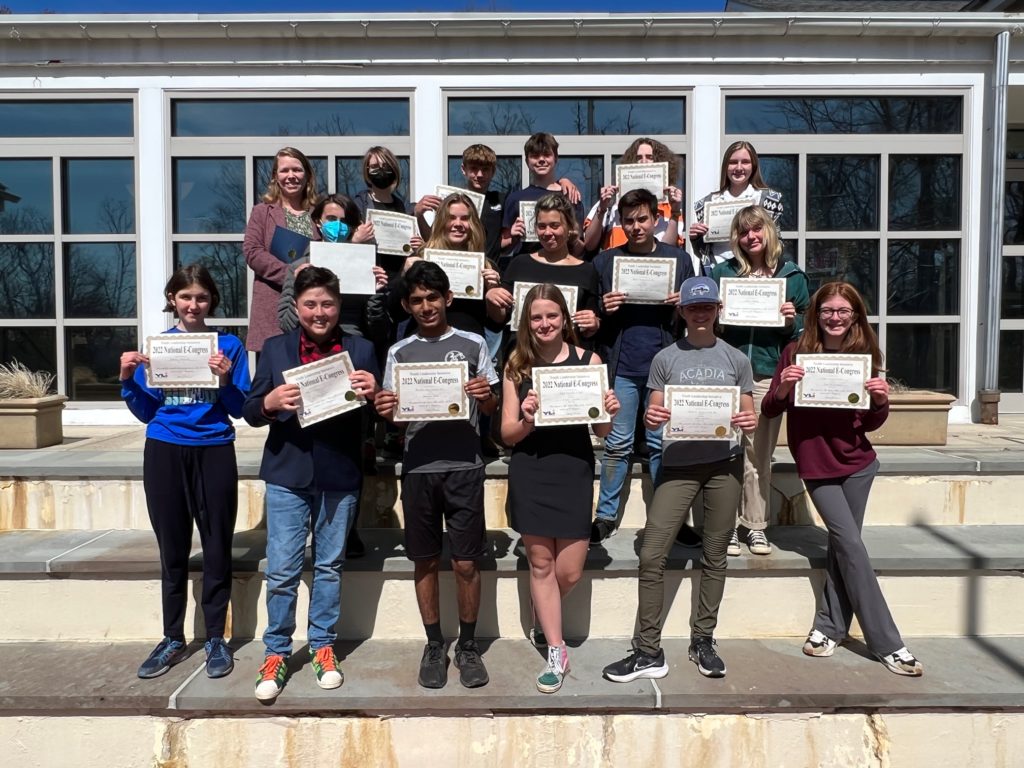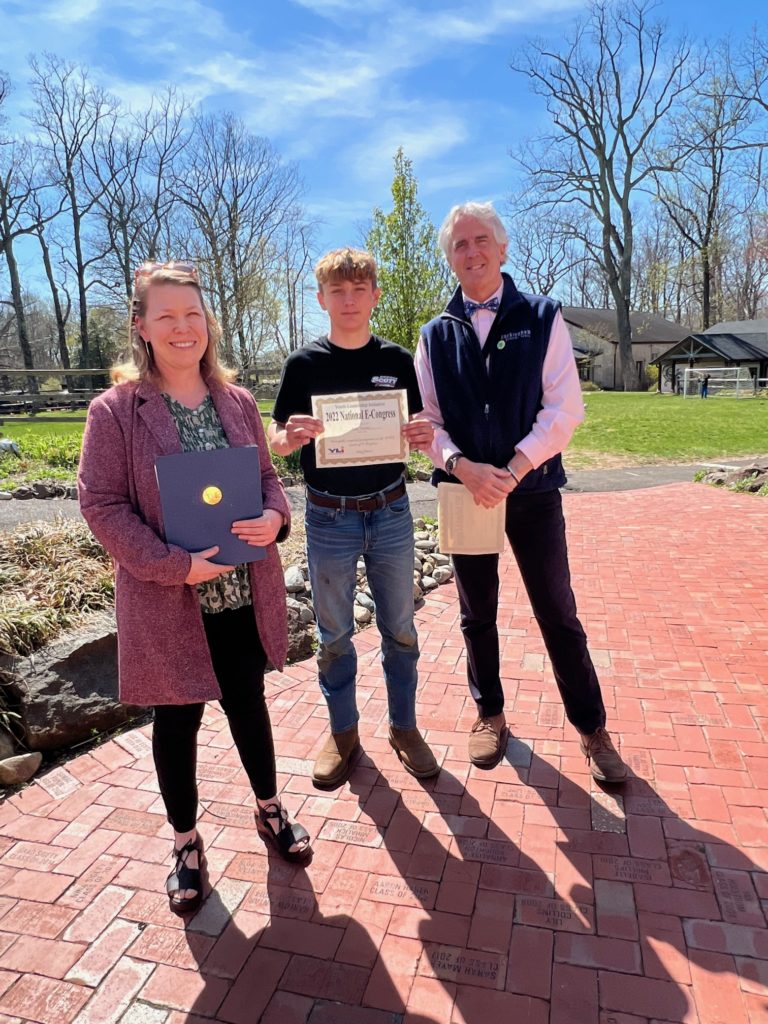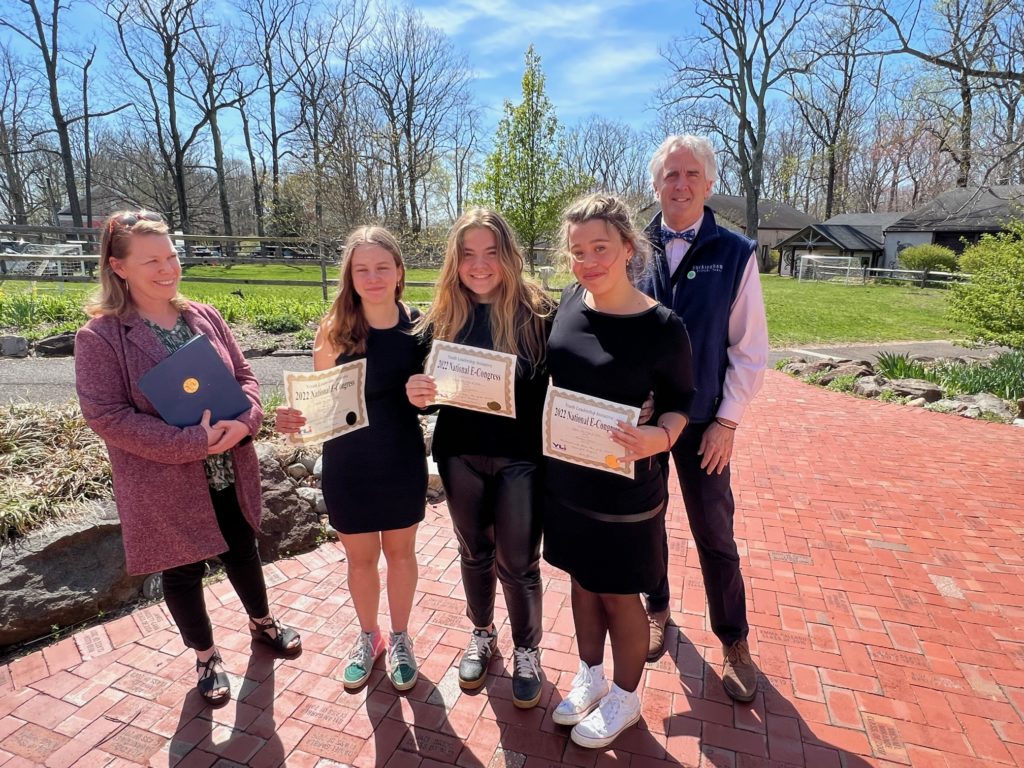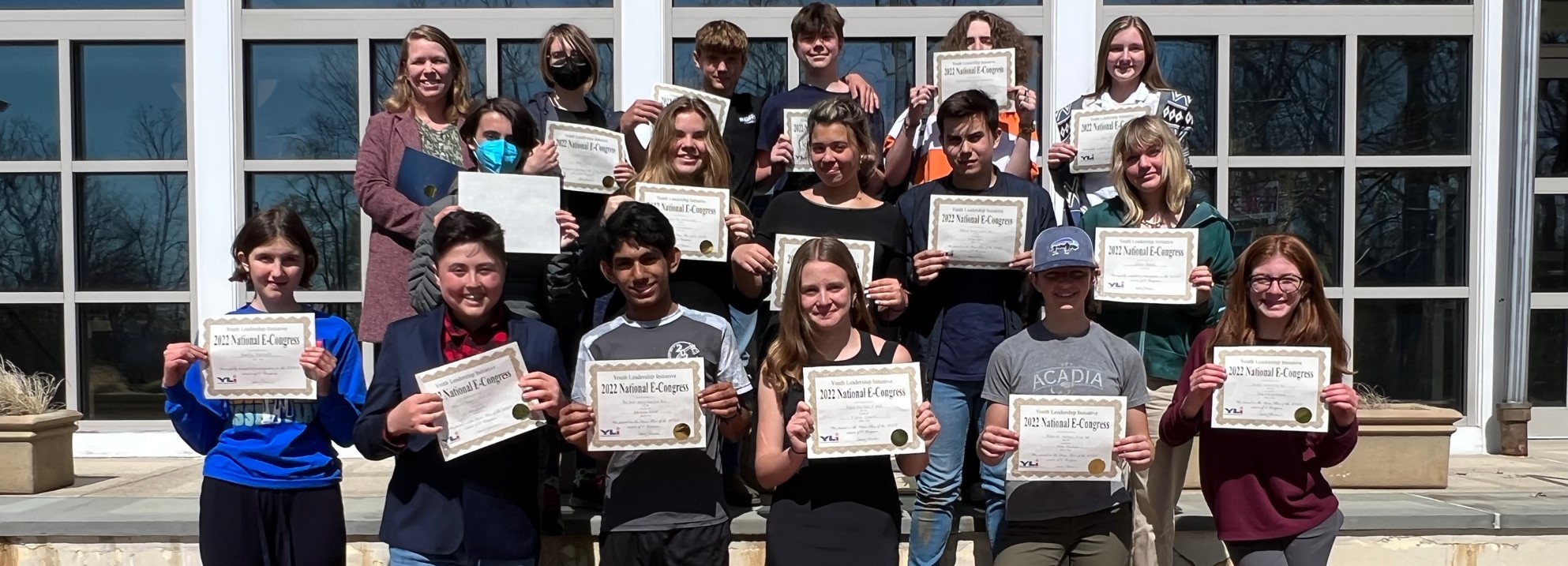
Buckingham Friends School’s mission is to “honor the Light within each person, inspire scholarship and spiritual community, and instill the value of caring for others and our world.” In addition, we exist to serve a larger public purpose; preparing students to participate in our democracy with open minds and hearts, a respect and regard for others, and a dedication and orientation that will enable them to care for and improve our world as active participants.
While we engage students in a comprehensive educational experience designed to develop their minds, whole selves, and qualities of personhood, one overarching principle is not to teach them “what to think” but rather “how to think.”

All of this was on full display Wednesday afternoon when the Upper School gathered to learn about the Eighth Grade’s participation in the e-Congress this year and to celebrate BFS’s Representatives and their fine work authoring and advancing legislation designed to improve our world for generations to come.
The Youth Leadership Initiative’s (YLI) E-Congress allows students to simulate the role of a representative in the United States Congress, by researching and drafting legislation, debating it in legislative committees, and voting. E-Congress is a multi-phase simulation that guides students step-by-step through the legislative process.
• Phase I: Introduction – learn about the legislative process

• Phase II: Research – explore topics and formulate ideas for writing a bill
• Phase III: Writing – write original legislation
• Phase IV: Committee– review bills from around the country in classroom committees. Vote to Approve, Reject, or Return to Author for Amendment. • Phase V: Amendment – Your students debate their bills’ amendments proposals and respond the amended bills that they voted on in Committee. • Phase VI: House Floor – vote individually and view results on the YLI website.
Summaries of the 2022 e-Congress Bills authored and introduced by Representatives from Buckingham Friends School
Motivated by a desire to improve our justice system, Representatives Ethan B., Jax Z. and Abby K. wrote the “Reduced Youths in Prison Act.” Supported by research and with clear intent, the purpose of the bill is to prevent children under the age of 18 from being tried as adults or transferred into adult prisons. The bill passed on the House Floor with more than twice as many “yea” votes than “nay”
Representatives Juliet B. and Iona M. authored an original bill to reduce collisions between cars and animals on our highways. Their “Mandated Animal Passageways Act” was designed to lower mortality rates in animals and people by mandating the construction of at least one animal passageway every 10 miles on highways passing through wild, undeveloped areas. Though it stalled in committee, it was an interesting and thoughtfully drafted piece of legislation.
After learning about the challenges many people with disabilities face when traveling by air, Representatives Charlotte M. and Elena H. authored the “Airport Accessibility Act”, the purpose of which is to make airports and air travel more accessible and safer for people with physical and/or mental disabilities. It would ensure that The American with Disabilities Act of 1990 (ADA) guidelines are enforced in all airports, provide additional staff training, and require accessibility modifications on airplanes. It is no surprise that this detailed, well-researched bill passed on the House Floor!
Concerned about high rates of accidental gun deaths in our country, Representatives Henry L. and Quinn W. authored a bill titled “A smart gun is a smarter gun.” The purpose of the bill is to fund companies working on smart gun technologies — firearms that use Biometrics to unlock the gun and let it fire— with the hopes to preventing children from taking and firing a gun owned by their parents. While it did not pass the committee phase, it was one of a number of innovative bills written to address the persistent problem of gun violence.
Passionate about advancing gender equality, Representatives Mirabel R., Christina M. and Fiona S. authored the “Equal Pay Fine of 2022 Act.” The goal of the bill is to end the pay gap between men and women by fining businesses that are found to be paying their employees unequally. Their bill certainly touched a nerve— it received the most number of “yea” votes of any bill in the class. Congratulations on your accomplishment, representatives!
Representative Abrahim Z. created “The Youth Vaping Reduction Bill” with the purpose of reducing rates of youth vaping through a national education initiative. The bill required that all middle and high schools provide an anti-vaping curriculum designed by public health experts to all of their students. It successfully passed on the House Floor!
Representative Jack E. was concerned about the impact that rising rates of drug addiction are having on our society and drafted a bill to increase access to addiction treatment. The purpose of the “Drug Rehabilitation Center Enhancement Act” was to lower drug fatality rates, improve quality of life for those impacted by drug addiction, and lower the drug-related crime rate in the United States by funding the creation of more rehabilitation centers around the country so that anyone who wants treatment can get it. His bill successfully passed on the House Floor.
Representative Jacob T.’s bill sought to reduce gun deaths through the use of innovative technologies. The “Finger Recognition and Gun Safety” Act required that gun manufacturers produce guns with smart triggers— that is triggers with fingerprint recognition that can only be fired by the registered gun’s owner. It advanced a creative solution to a critical problem, and passed through the committee phase before ultimately falling short of the required votes. Congratulations on a job well done, Representative!
Representative Jacob H. sought to improve our justice system with his thoughtful bill, the “End Mandatory Minimums Act of 2022.” This bill would improve fairness and equity by eliminating mandatory minimums in sentencing, and require a panel of two judges instead of one in federal courts when sentencing decisions are made. His bill successfully passed on the House Floor!
Representative Emilia M.’s bill, the “Steps to an Ethical Food System Act” was written to create a more ethical process for the slaughter of farm animals in the meat industry. It would expand the existing Humane Methods of Slaughter Act to include birds, fish, and rabbits. Though it did not receive the support necessary to advance to a House vote, it was an impressive piece of legislation that reflected Representative’s commitment to improving animal welfare in our country.
Representative Sam R. endeavored to reform our food system with his bill, “Farming for the Future Act.” The bill was expansive, with provisions that would make factory farms better for the environment by reducing waste output and capturing a renewable energy source, set targets for reducing emissions, require participation in biofuel production, and investing in sustainable technological development. The bill passed on the house floor!

I appreciate the teaching and guidance of Upper School Social Studies teacher and JEM Program Coordinator, Laura Downs, and congratulate each and every member of our Eighth Grade class. I could not be prouder of our students. Be assured, every bill would get my vote!


What a wonderful opportunity! Thanks for your hard work, kindness and thoughtfulness. I appreciate BFS and am so grateful my grandchildren have been able to attend.